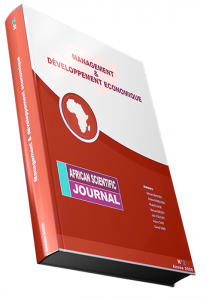International NGOs and Development aid in the South Region of Cameroon: The Agency Relationship
DOI:
https://doi.org/10.5281/zenodo.8086771Keywords:
Agency relationship, information asymmetry, international NGOs, local populationsAbstract
The aim of this article is to highlight the divergences of interests between international NGOs and local populations of the Southern Region of Cameroon, in the context of development aid. The hypothesis of asymmetrical information between the parties was put forward. The analysis in this case led to the use of agency theory, as developed by Charreaux (1999) and De Bornier (2004). The results show that informational asymmetries encourage moral hazard and adverse selection in NGO interventions, since these are mainly health-related and do not meet the main expectations of local populations. The study recommends a participatory approach by local populations in the implementation of NGO activities, and a greater role for the State in coordinating the activities of these actors.
Downloads
Published
How to Cite
Issue
Section
License
Copyright (c) 2023 African Scientific Journal

This work is licensed under a Creative Commons Attribution-NonCommercial-NoDerivatives 4.0 International License.





















